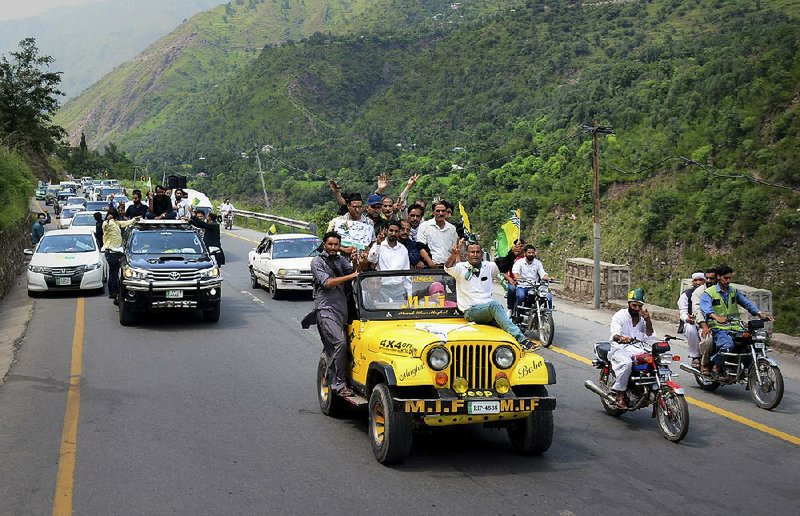NEW DELHI -- India's government on Saturday barred several opposition leaders from visiting Indian-administered Kashmir to assess the situation created by a security crackdown in the region that started earlier this month.
Authorities sent the opposition leaders back to New Delhi after they waited for several hours at the airport in Srinagar, the main city in the region, said Vineet Punia, an official with the opposition Congress party.
On the Pakistani side of Kashmir, police stopped hundreds of journalists from symbolically trying to cross the highly militarized border into Indian-controlled Kashmir.
The Indian opposition leaders, representing nine political parties, flew to Srinagar from New Delhi nearly three weeks after Prime Minister Narendra Modi's government revoked Muslim-majority Kashmir's decades-old special status guaranteed under India's constitution. The government followed the move with an intense crackdown, which included a media blackout and was backed by thousands of troops.
The opposition leaders included Rahul Gandhi of the Congress party, Sitaram Yechury of the Communist Party of India (Marxist), Sharad Yadav of Janata Dal (United) and Majeed Memon of the Nationalist Congress Party.
Authorities on Friday had advised them against visiting the region, citing a sensitive law-and-order situation. But there was no official comment Saturday on disallowing the opposition leaders from visiting Srinagar and other parts of the region.
"We are not going to disturb peace there," Memon told reporters in New Delhi before boarding the flight to Srinagar.
Ghulam Nabi Azad, a Congress party leader, said part of the reason for the visit was to look into the government's claims that normalcy is returning to the region. "We are going to assess the situation there and find out the ground reality," he said.
The changes in Indian-controlled Kashmir's status allow anyone to buy land in the territory, which some Kashmiris fear could mean an influx of Hindus who would change the region's culture and demographics.
Indian authorities are gradually easing restrictions, allowing some businesses to reopen in Srinagar and other places. Landline phone service has been restored in some areas. Officials also say they have opened grade schools, but both student and teacher attendance has been sparse.
Also on Saturday, the Pakistani police prevented hundreds of journalists from crossing into Indian-controlled Kashmir.
The journalists' leader, Zafeer Baba, said the protest was an attempt to report on the situation in Kashmir. Journalists from Islamabad and other cities also traveled to Muzaffarabad to take part in the protest.
Local Kashmiris joined the journalists' protest, chanting slogans against what they said was "Indian oppression."
Pakistani police officer Arshad Naqvi said the journalists' vehicles were stopped about 4 miles from the Line of Control, which divides the Himalayan region.
Meanwhile, Pakistani Foreign Minister Shah Mahmood Qureshi said he spoke by phone with U.N. Secretary General Antonio Guterres and discussed the security situation in Indian-controlled Kashmir and allegations of human-rights violations by India.
Kashmir is divided between Pakistan and India but claimed by both in its entirety. The nuclear-armed archrivals have fought two of their three wars over Kashmir since gaining independence from British rule in 1947.
Information for this article was contributed by Roshan Mughal and Zarar Khan of The Associated Press.
A Section on 08/25/2019

